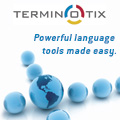| Most helpful review | Works perfectly ! SDL Trados just ignores the Mac users. It is expensive, the updates are expensive, innovations are rare, the technical support is not responsive.
Swordfish is a multi-platform tool. It is relatively cheap, the updates are free. It is a rather new product. Innovations, improvements are coming in regularly. The technical support and the forum are super responsive. The TMX files are Trados compatible.
No more SDL Trados for me !!!!!11 out of 12 found this review helpful.
Read more reviews → | Very powerful, flexible and user-friendly Logiterm is not a translation memory software in the strict sense insofar as it doesn’t memorize segments as you translate them. However, it is a very powerful and intuitive tool for leveraging past translations, documentation, glossaries, etc.
PROS
- The most accurate alignment engine out there.
- The most flexible and effective tool for accessing past translations that I have tried. You can add the most relevant and/or reliable previous translations and glossaries to the TM you use to pretranslate a doc but still access your entire corpus of past translations, related documents and glossaries in another window when editing and confirming the translation. You can search your entire corpus or specific parts of it, search full text or translation pairs, use search parameters, etc.
- Very easy to learn and easy to work with, especially when translating in Word. For Word, Logiterm installs a toolbar instead of forcing you to work in another environment. Past translation pairs with highlighted differences appear in a pop-up window for editing and are then entered directly in the Word document. I find it a much more natural and flexible way to translate than working in a TEnT. You can use the Logiterm pop-up window where you want, switch back to translating directly in Word where it makes more sense, continue accessing Logiterm’s search functions whenever you want. There are no formatting glitches caused by exporting the finished translation from the TEnT back to Word (except that inline codes must be added manually in Word). At the same time, Logiterm doesn’t have the severe limitations of the Wordfast Word add-on.
- The almost-free Logiterm toolbar makes it easy to share output with collaborators who don’t own Logiterm and lets them use and edit pretranslation results as effectively as owners of the software.
- Tech support is fast and helpful.
CONS
- Not nearly as good as MemoQ or other conventional TMs for translating a document with many internal repetitions but no similarity to past translations. Logiterm will identify 100% matches within a document and propagate your translation throughout the file but it can’t find internal fuzzy matches within a document.
- No QA function. If you want QA, you have to use a separate error-checking software. I use Verifika and in a way I don’t mind, since I find Verifika is much better than the built-in error checkers in other CAT tools anyway, but it is definitely a more cumbersome process.
- Terminotix is very slow to fix bugs. For example, Logiterm doesn’t process end-of-segment punctuation, just leaves it as is. So if a segment ends with a space followed by a colon or semi-colon, there is no way to remove the space in Logiterm. If a segment ends with a bracket, Logiterm leaves it there, even if you have moved the parentheses to inside the segment. You have to edit out unwanted end-of-segment punctuation in Word. This is not a huge problem since you have the Word screen in front of you as you translate in the Logiterm pop-up window, but Terminotix has known about this bug for years and definitely should have addressed it by now.
BOTTOM LINE
I have been using Logiterm as my main CAT tool for about 10 years and, despite some irritants, I still find it to be the smoothest CAT software to work with. After trying others periodically, I keep coming back to Logiterm because of its flexibility and ease of use.
UPDATE
Since I wrote this review, a new Logiterm release has fixed the bugs and added the ability to find and process fuzzy matches within a document.
So, at this point, the only situation in which I would still prefer memoQ to Logiterm is a large project with many internal repetitions that has to be divided among several translators. Logiterm has nothing comparable to the capabilities of memoQ's server edition. But for any one-man job, I think Logiterm is the cleaner solution now. 8 out of 8 found this review helpful.
Read more reviews → |
| Product description | Swordfish III is an advanced CAT (Computer Aided Translation) tool based on XLIFF 1.2 open standard, designed for demanding professional translators.
Swordfish III supports exchanging TMX (Translation Memory eXchange), the vendor-neutral open XML standard for the exchange of Translation Memory (TM) data created by Computer Aided Translation (CAT) and localization tools, originally published by LISA (Localisation Industry Standards Association).
Swordfish includes a super fast Internal database server and integrated support for RemoteTM in its two editions: LAN Server and Web Server. You can also use third party database engines like Oracle 10g, MySQL 5.x and Microsoft SQL Server 2005/2008 for storing TM and terminology data | A COMPLETE TRANSLATION SOFTWARE COMBINING A FULL-TEXT SEARCH ENGINE WITH TRANSLATION, TERMINOLOGY, DATA CONVERSION AND ALIGNMENT TOOLS |





